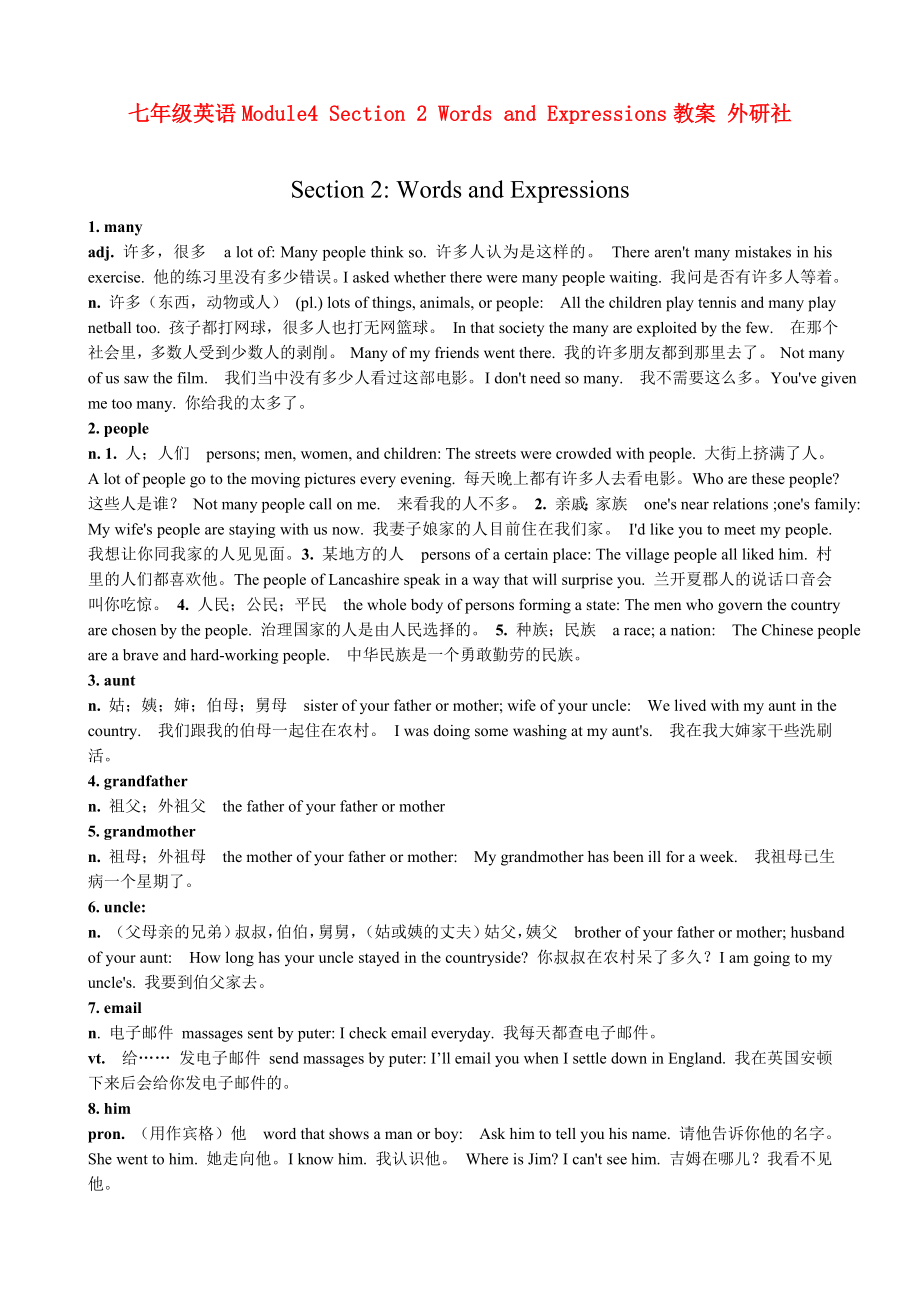《七年級(jí)英語(yǔ)Module4 Section 2 Words and Expressions教案 外研社》由會(huì)員分享,可在線閱讀���,更多相關(guān)《七年級(jí)英語(yǔ)Module4 Section 2 Words and Expressions教案 外研社(1頁(yè)珍藏版)》請(qǐng)?jiān)谘b配圖網(wǎng)上搜索���。
1、七年級(jí)英語(yǔ)Module4 Section 2 Words and Expressions教案 外研社
Section 2: Words and Expressions
1. many
adj. 許多���,很多 a lot of: Many people think so. 許多人認(rèn)為是這樣的���。 There aren't many mistakes in his exercise. 他的練習(xí)里沒有多少錯(cuò)誤���。I asked whether there were many people waiting. 我問是否有許多人等著。
n. 許多(東西���,動(dòng)物或人) (pl.) lots of
2���、things, animals, or people: All the children play tennis and many play netball too. 孩子都打網(wǎng)球,很多人也打無(wú)網(wǎng)籃球���。 In that society the many are exploited by the few. 在那個(gè)社會(huì)里���,多數(shù)人受到少數(shù)人的剝削。 Many of my friends went there. 我的許多朋友都到那里去了���。 Not many of us saw the film. 我們當(dāng)中沒有多少人看過這部電影���。 I don't need so many. 我不需要這么多。 Y
3���、ou've given me too many. 你給我的太多了���。
2. people
n. 1. 人���;人們 persons; men, women, and children: The streets were crowded with people. 大街上擠滿了人。A lot of people go to the moving pictures every evening. 每天晚上都有許多人去看電影���。Who are these people? 這些人是誰(shuí)? Not many people call on me. 來(lái)看我的人不多���。 2. 親戚���;家族 one's near
4、 relations ;one's family: My wife's people are staying with us now. 我妻子娘家的人目前住在我們家���。 I'd like you to meet my people. 我想讓你同我家的人見見面���。3. 某地方的人 persons of a certain place: The village people all liked him. 村里的人們都喜歡他。The people of Lancashire speak in a way that will surprise you. 蘭開夏郡人的說(shuō)話口音會(huì)叫你吃驚���。 4. 人民���;公
5���、民;平民 the whole body of persons forming a state: The men who govern the country are chosen by the people. 治理國(guó)家的人是由人民選擇的���。 5. 種族���;民族 a race; a nation: The Chinese people are a brave and hard-working people. 中華民族是一個(gè)勇敢勤勞的民族。
3. aunt
n. 姑���;姨���;嬸;伯母���;舅母 sister of your father or mother; wife of your unc
6���、le: We lived with my aunt in the country. 我們跟我的伯母一起住在農(nóng)村。 I was doing some washing at my aunt's. 我在我大嬸家干些洗刷活���。
4. grandfather
n. 祖父���;外祖父 the father of your father or mother
5. grandmother
n. 祖母���;外祖母 the mother of your father or mother: My grandmother has been ill for a week. 我祖母已生病一個(gè)星期了
7、���。
6. uncle:
n. (父母親的兄弟)叔叔���,伯伯,舅舅���,(姑或姨的丈夫)姑父,姨父 brother of your father or mother; husband of your aunt: How long has your uncle stayed in the countryside? 你叔叔在農(nóng)村呆了多久���?I am going to my uncle's. 我要到伯父家去���。
7. email
n. 電子郵件 massages sent by puter: I check email everyday. 我每天都查電子郵件。
vt. 給…… 發(fā)電子郵件 send massages by puter: I’ll email you when I settle down in England. 我在英國(guó)安頓下來(lái)后會(huì)給你發(fā)電子郵件的���。
8. him
pron. (用作賓格)他 word that shows a man or boy: Ask him to tell you his name. 請(qǐng)他告訴你他的名字���。She went to him. 她走向他。I know him. 我認(rèn)識(shí)他���。 Where is Jim? I can't see him. 吉姆在哪兒���?我看不見他���。
 七年級(jí)英語(yǔ)Module4 Section 2 Words and Expressions教案 外研社
七年級(jí)英語(yǔ)Module4 Section 2 Words and Expressions教案 外研社
